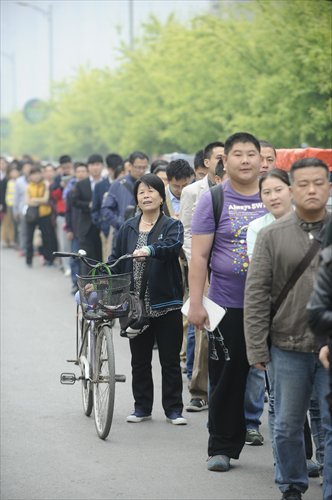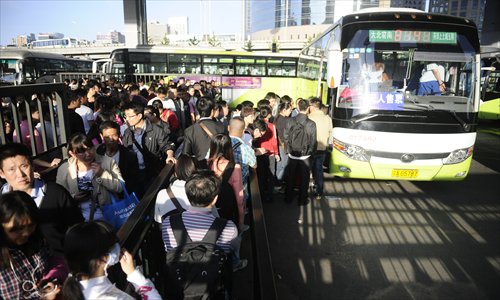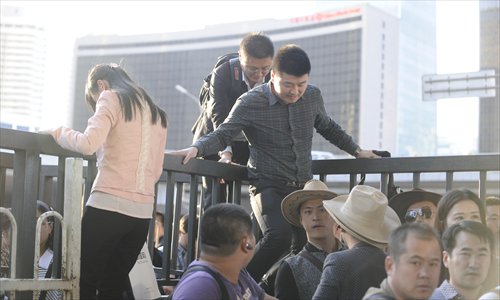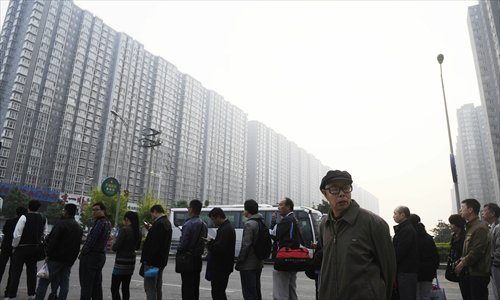Early birds get the bus

People waiting for Beijing-bound bus 814 line up at around 6 am on May 8 in Yanjiao, Hebei Province. An estimated 300,000 residents of the satellite town commute to Beijing each weekday for work. Photo: Li Hao/GT
Like many seniors, Xu Wenyuan is up at the crack of dawn most mornings. But the 66-year-old's early-bird routine isn't to practice tai chi or meet friends for a game of Chinese chess.
Since moving a year ago to Yanjiao, a town in Hebei Province near southeast Beijing's Tongzhou district, to live with his daughter and her family, Xu's most important daily task has been waiting in line at a bus stop on route 814 to allow his daughter to get some extra sleep. He normally waits between 30 minutes and an hour before swapping places with his 33-year-old daughter, Xu Yin, ahead of her commute to work at an information technology company in Beijing. Even at dawn, the length of the line varies between 100 meters and 400 meters.
Originally from Qinhuangdao, Hebei Province, Xu Yin bought her apartment in Yanjiao in April 2013. Beijing's high cost of living and hukou (household registration) restrictions have led many workers like her to settle in Yanjiao. Despite mammoth lines for a journey of up to two hours depending on traffic, bus 814 is favored by most locals as the best way to get to work in Beijing.
"Her life isn't easy. There's no subway here. I just help as much as I can," said Xu Wenyuan, who doesn't let his stiff joints or freezing weather deter him from lining up each day.
Located about 35 kilometers east of Beijing's East Third Ring Road, Yanjiao has become a hub for workers unable to afford living in Beijing. Housing prices in the satellite town have climbed over the past year amid its population explosion, but they remain a fraction of the costs in the capital.
"I just want her to get some more sleep. This kind of work [lining up] is nothing," Xu Wenyuan said.

Commuters line up for Yanjiao-bound buses at Guomao. Photo:Li Hao/GT
Parental love in the line
Yanjiao stirs to life each morning at 5 am when early risers swarm to line up for the day's first 814 bus at 5:30 am.
Route 814 is one of nine interprovincial bus services connecting Yanjiao with downtown Beijing. It's also the busiest one, transporting thousands of people daily.
Lining up at the bus stop, it's easy to spot grey-haired heads in stark contrast to most other commuters: young, yawning white-collar workers. If elderly early birds haven't been substituted by their children by the time they reach the front of the line, they move to the side and allow people behind them to board the bus.
Xu Wenyuan usually greets other parents, mostly in their 50s or 60s, who share his mission for their adult children. "There are 15 or 16 of us [parents] at this bus stop," he said.
His morning routine doesn't relax when his daughter boards bus 814. After returning home he feeds his 4-year-old granddaughter before taking her to kindergarten at around 8 am.
Liu Liansheng, 66, moved with his wife to Yanjiao a month ago to live with their daughter. The couple takes turns waiting in line for their daughter and son-in-law. Liu can cope with the dawn chill, but has a harder time dealing with poor queue etiquette. "People jump in line every day," he complained.
Competition is fierce each morning in line. Xu Wenyuan has witnessed his share of pushing, shoving and even fighting among commuters over the past year. To counter such behavior, some elderly locals donning red armbands have appointed themselves bus stop monitors to maintain order and reprimand queue jumpers.
The sight of elderly people lining up each morning at Yanjiao bus stops has generated heated debate.
"People who don't know the true situation will condemn us, calling us unfilial. But those who live here can understand, and know the bus stop situation is terrible," said Xu Yin.
A report by China Youth Daily found some parents line up at bus stops despite objections from their children. English teacher Lemon Li, who lives in Yanjiao and works in Beijing, said she would never let her parents line up for her. "I couldn't be so hardhearted to let my parents be bullied like that," she said.

Queue jumpers climb over a barrier to advance in a line at a Guomao bus stop in Beijing's CBD. Photo: Li Hao/GT
Long way homePeople lining up at the bus stop are often roused awake by the smell of fried crepes and steamed buns mixed with gasoline fumes. For those lucky enough to get a seat on the bus, there is a chance to rest and briefly return to their dreams en route to Beijing.
The bus stops at CBD terminal Guomao. Some passengers then stroll to work, while others begin the second leg of their journey on another bus or the subway.
In the evening, Yanjiao's workers begin their long journey home from Guomao. Buses bound for the Hebei town arrive one after another from 6 pm, but hardly seem to make the long line of commuters any shorter.
"Shame on you!" angry shouts erupt from the crowd from time to time when queue jumpers are caught. Anger is also tinged with despair for those deep in line, who must wait even longer to get home.
A few men weave up and down the line distributing pamphlets advertising real estate shouting, "Buy houses in Yanjiao! Only one stop from Guomao!"
Graphic designer Zhang Hong, 30, has learned some tricks over her past two years as a marathon commuter. "To avoid the huge crowds at Guomao, I take a bus to Subway Line 6 and then another bus from Caofang Station back to Yanjiao," said Zhang, originally from Fuyang, Anhui Province.
But for women like Zhang, their petite frames make it harder to hold their ground or elbow their way on board. "It takes two hours [for a single trip], and it's very tiring," she said.
Other transport options include carpooling and driving, but neither is appealing considering the highway from Yanjiao to Beijing is often congested during rush hour.

The sight of elderly people lining up at bus stops for their adult children who work in Beijing is a common sight each weekday morning in Yanjiao. Photo: Li Hao/GT
Big dreams in 'sleeping town'The question Yanjiao residents are most commonly asked is why grind out such a tough life that burdens their parents.
"Whether all this is worth it or not isn't the question; it's just that there is no better solution," said Zhang.
Zhang's goal to buy an apartment before 30 was one of the reasons she chose to settle in Yanjiao. When she bought her home in 2011, she paid 10,000 yuan ($1,601) per square meter. She estimates her home's value has since appreciated 40 percent.
Yanjiao is dubbed the "Sleeping Town" on account of its relatively lifeless state during the day. Some 300,000 people make the interprovincial journey to work in Beijing and return home to sleep in Yanjiao, meaning only 40 percent of the town's population, mostly the elderly and children, are in town during daytime.
Construction and the local real estate sector are flourishing. The population has grown in stride with infrastructure development, with newly built schools, supermarkets and hospitals a sign of its transformation. But streets lined with snack stands and hole-in-the-wall restaurants provide a reminder of Yanjiao's past as a once sleepy village.
The town's infamous bus stop lines represent the tip of the iceberg of a more serious housing problem faced by beipiao (young Beijing workers without a local hukou), and presents a major challenge to urban planners.
The central government plans to integrate Beijing, Tianjin and Hebei into a mega urban cluster, with a draft plan released in April signaling the development of several new satellite towns around Beijing. The towns are expected to be connected to Beijing through rail links, providing new hope among Yanjiao locals that their town might soon join the capital's sprawling subway network.